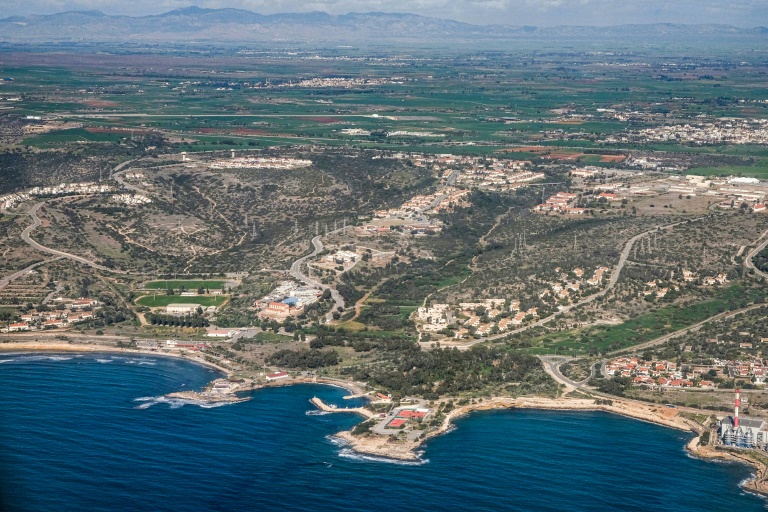‘Like it or not’, Britannia still rules part of Cyprus

An aerial view of Britain’s military Dhekelia Sovereign Base Area in eastern Cyprus, a former British colony which became independent in 1960
Dhekelia – Next to a palm tree, the Union Jack hangs limply on a pole outside a simple courthouse built decades ago on this eastern Mediterranean island.
“Morning your honour,” the clerk said in English to the British judge, beginning another day at Her Majesty’s Court in Waterloo Road, Dhekelia.
In this part of Cyprus, a former British colony, Britain is still in charge and Cypriots appear before the court.
Some on the island liken the arrangement to continued colonisation. Scholars called it “undeniably anachronistic” and “highly unusual”.
“It is different,” said Major General Rob Thomson, the top official in the sovereign areas, “but it’s different because it serves a different purpose.”
Cyprus became independent from Britain in 1960 after a bloody guerrilla campaign.
Under that treaty, which Greece and Turkey also signed, Britain retained control over two military zones in the east and south of the island, Sovereign Base Areas (SBAs) where thousands of Cypriots live -– outnumbering British troops.
They comprise the only British overseas territory effectively run through the defence ministry, Thomson, 55, told AFP, a portrait of Queen Elizabeth II hanging in his office.
His three “guiding principles” are to operate the bases, cooperate with Cyprus and to “look after the interests of the people who live there”.
Thomson oversees SBA police, courts, customs and immigration, and a prison — all run separately from the Republic of Cyprus — though laws in the base areas reflect Cypriot regulations.
SBA officers, most of whom are Cypriots, have jurisdiction over 12,000 compatriots living on base land along with 5,662 British troops and their families.
Since no physical borders separate SBA land from the Republic of Cyprus, it’s difficult to tell where their jurisdiction begins -– except for the tell-tale cricket pitch lying in a spectacular valley.
Beaches, ancient ruins and bird-rich wetlands are attractions for tourists, who are also subject to SBA law.
Nicos Costa, one person before the court, was charged with driving while disqualified. It “is a serious offence”, the judge said, as Costa faced a possible two-year jail term.
– Colonial ‘remnants’ –
“It’s a bit strange. Don’t you think?” said Costas Evripidou, a community councillor in Akrotiri, a hilltop village on SBA land on Cyprus’s southern tip.
For Evripidou, the court symbolises an odd arrangement which limits his rights and is seen by many as “remnants of the colonies”.
Akrotiri lies just outside the fences of a Royal Air Force base, from where warplanes thunder off as part of the international coalition against the Islamic State group.
The base has supported operations in Iraq and Afghanistan, and helped reinforce NATO’s eastern flank after Russia invaded Ukraine.
British administration of Cypriots is “not logical anymore”, argued George Perdikis, who protested at the base during two decades as a Green party lawmaker.
Officials from Cyprus and Britain conceded there had been unequal treatment of Cypriot SBA residents due to restrictions on developing their property, which have now changed under new rules adopted last month.
Andreas Theophanous, head of the University of Nicosia’s politics department, said allowing non-military development on base land is “a positive step” but “it’s not enough”.
The island has been divided since 1974 when Turkey invaded following a Greek-sponsored coup.
The Republic of Cyprus, a European Union member with an overwhelmingly Greek-Cypriot majority, controls the southern two-thirds of the island. Only Ankara recognises the self-declared Turkish Republic of Northern Cyprus.
Theophanous and other Cypriots see Britain’s role as intertwined with what they call the “Cyprus problem”.
“Britain has benefited from the bases,” he said, but did not in turn fulfil its treaty obligations “to protect the territorial integrity, sovereignty and independence of the Republic of Cyprus”.
Anti-British anger resurfaced when Cypriot groups withdrew from an SBA charity concert marking the queen’s Platinum Jubilee. Critics have linked her to Britain’s hanging of nine Cypriots during the 1955-59 armed struggle by Greek nationalists to unite Cyprus with Greece.
– ‘Global presence’ –
“Britain has not come to terms with the past,” said Theophanous, calling for London to make a symbolic gesture acknowledging “those executed by the British authorities in the 1950s” and to work to end the Turkish occupation.
But Thomson said the “venomous criticism” of the concert was from a tiny minority, arguing the focus should be on “the profound partnership that we share”.
“The UK is absolutely invested in trying to find a solution to the Cyprus problem,” he stressed.
Apart from warplanes and what Thomson called a “significant” intelligence capability, the bases host two infantry battalions, one on standby for rapid deployment. They help make Britain, its NATO allies, and the region safer, he said.
“It gives us global presence,” he said, offering “strategic advantage” to the West, with no disadvantages for Cypriots.
Ypsonas Mayor Pantelis Georgiou can see things from both sides. About 25 percent of his community, and roughly 1,000 residents, lies inside the base.
Despite questions about the arrangement “whether we like it or not it’s within” the 1960 agreement, Georgiou said.
